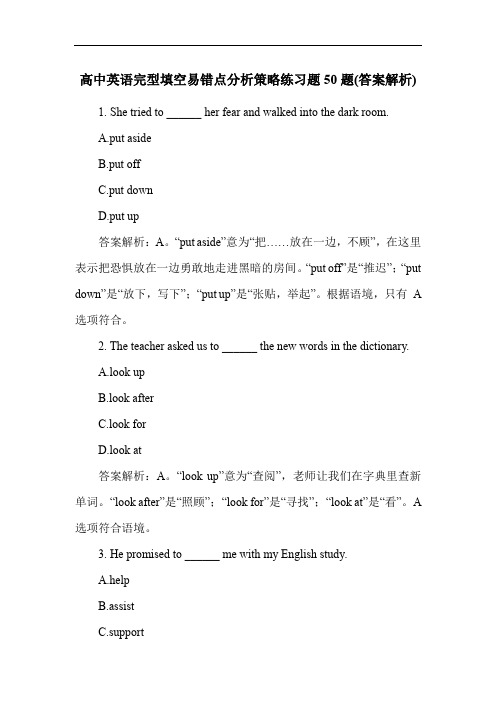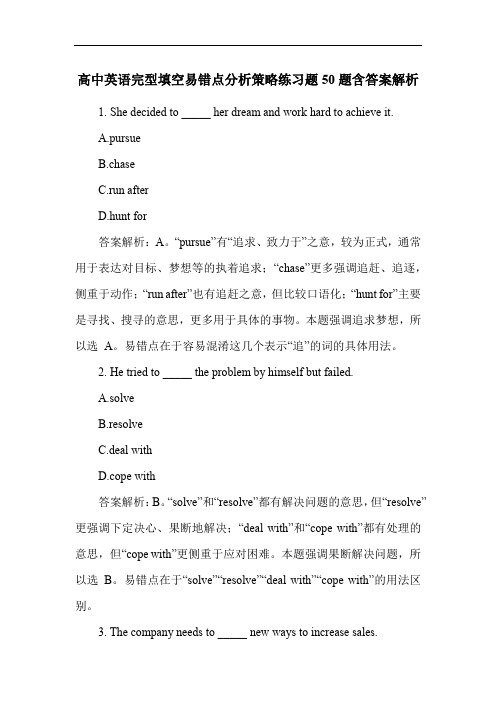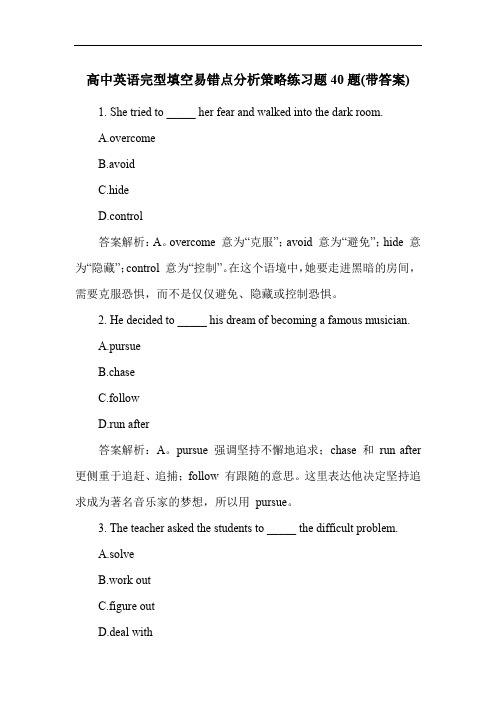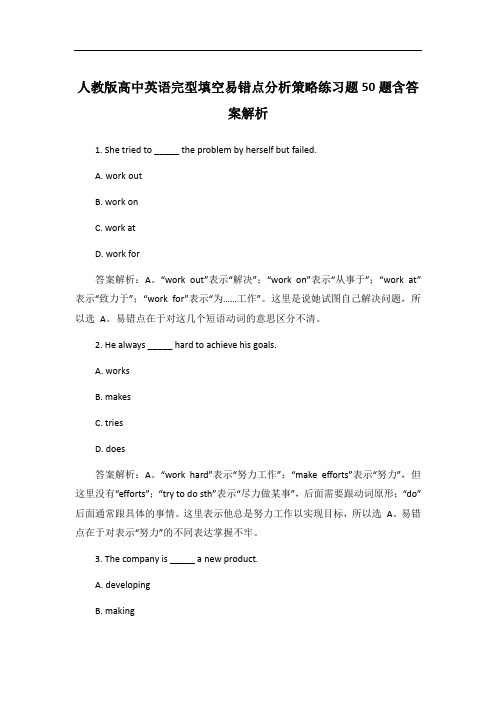高考英语 易错题查漏补缺 完形填空精选练习(28)
高中英语完型填空易错点分析策略练习题50题(答案解析)

高中英语完型填空易错点分析策略练习题50题(答案解析)1. She tried to ______ her fear and walked into the dark room.A.put asideB.put offC.put downD.put up答案解析:A。
“put aside”意为“把……放在一边,不顾”,在这里表示把恐惧放在一边勇敢地走进黑暗的房间。
“put off”是“推迟”;“put down”是“放下,写下”;“put up”是“张贴,举起”。
根据语境,只有A 选项符合。
2. The teacher asked us to ______ the new words in the dictionary.A.look upB.look afterC.look forD.look at答案解析:A。
“look up”意为“查阅”,老师让我们在字典里查新单词。
“look after”是“照顾”;“look for”是“寻找”;“look at”是“看”。
A 选项符合语境。
3. He promised to ______ me with my English study.A.helpB.assistC.supportD.aid答案解析:B。
“assist sb with sth”是固定搭配,表示“在某事上帮助某人”。
“help”一般用“help sb (to) do sth”;“support”是“支持”;“aid”通常用“aid sb in doing sth”。
B 选项最符合。
4. The firemen managed to ______ the fire in time.A.put outB.put offC.put downD.put up答案解析:A。
“put out”意为“扑灭”,消防员及时扑灭了火。
“put off”是“推迟”;“put down”是“放下,写下”;“put up”是“张贴,举起”。
高中英语完型填空易错点分析策略练习题50题含答案解析

高中英语完型填空易错点分析策略练习题50题含答案解析1. She decided to _____ her dream and work hard to achieve it.A.pursueB.chaseC.run afterD.hunt for答案解析:A。
“pursue”有“追求、致力于”之意,较为正式,通常用于表达对目标、梦想等的执着追求;“chase”更多强调追赶、追逐,侧重于动作;“run after”也有追赶之意,但比较口语化;“hunt for”主要是寻找、搜寻的意思,更多用于具体的事物。
本题强调追求梦想,所以选A。
易错点在于容易混淆这几个表示“追”的词的具体用法。
2. He tried to _____ the problem by himself but failed.A.solveB.resolveC.deal withD.cope with答案解析:B。
“solve”和“resolve”都有解决问题的意思,但“resolve”更强调下定决心、果断地解决;“deal with”和“cope with”都有处理的意思,但“cope with”更侧重于应对困难。
本题强调果断解决问题,所以选B。
易错点在于“solve”“resolve”“deal with”“cope with”的用法区别。
3. The company needs to _____ new ways to increase sales.A.find outB.look forC.discoverD.invent答案解析:D。
“find out”强调经过调查、研究后发现;“look for”是寻找的意思;“discover”是发现已存在但不为人知的事物;“invent”是发明、创造新的东西。
本题说公司需要创造新的方法来增加销售,所以选D。
易错点在于对这几个表示“找”或“发现”的词的区分。
4. She always _____ her parents for advice.A.asksB.requestsC.seeksD.demands答案解析:C。
高中英语完型填空易错点分析策略练习题40题(带答案)

高中英语完型填空易错点分析策略练习题40题(带答案)1. She tried to _____ her fear and walked into the dark room.A.overcomeB.avoidC.hideD.control答案解析:A。
overcome 意为“克服”;avoid 意为“避免”;hide 意为“隐藏”;control 意为“控制”。
在这个语境中,她要走进黑暗的房间,需要克服恐惧,而不是仅仅避免、隐藏或控制恐惧。
2. He decided to _____ his dream of becoming a famous musician.A.pursueB.chaseC.followD.run after答案解析:A。
pursue 强调坚持不懈地追求;chase 和run after 更侧重于追赶、追捕;follow 有跟随的意思。
这里表达他决定坚持追求成为著名音乐家的梦想,所以用pursue。
3. The teacher asked the students to _____ the difficult problem.A.solveB.work outC.figure outD.deal with答案解析:D。
solve 通常指解决数学问题等;work out 也有解决问题的意思,但更强调通过努力得出结果;figure out 侧重于弄明白、想出;deal with 可以表示处理各种问题,包括困难的情况。
这里老师让学生处理难题,deal with 更合适。
4. She managed to _____ her shyness and talk to the stranger.A.get overB.get rid ofC.get throughD.get across答案解析:A。
get over 有克服、熬过的意思;get rid of 是摆脱、除去;get through 有通过、完成的意思;get across 是使被理解。
人教版高中英语完型填空易错点分析策略练习题40题

人教版高中英语完型填空易错点分析策略练习题40题1. The ______ of the new shopping mall attracted a large number of people.A. openingB. openC. openedD. opens答案:A易错点分析:学生容易误选 B 选项“open”,“open”作动词时表示“打开”,作形容词时表示“开着的”。
而这里需要一个名词,“opening”有“开业、开幕”的意思,是名词形式。
2. She has a ______ smile on her face.A. charmingB. charmC. charmedD. charms答案:A易错点分析:“charm”是名词“魅力”,B 选项不符合。
“charmed”常表示“被迷住的”,C 选项不符合语境。
“charms”是复数形式,这里需要一个形容词,A 选项“charming”意为“迷人的”,修饰“smile”。
3. His ______ words made everyone happy.A. funnyB. funC. funningD. funned答案:A易错点分析:“fun”作名词时表示“乐趣”,作形容词时意为“有趣的”,但侧重于指事情有趣。
“funny”侧重于“滑稽的、好笑的”,这里修饰“words”,A 选项更合适。
4. The ______ of the book is very interesting.A. contentB. contentsC. containD. containing答案:A易错点分析:“content”作名词时,意为“内容”,是不可数名词。
“contents”通常指“目录”。
“contain”是动词,“containing”是动名词形式,都不符合题意。
5. The ______ of the film is very exciting.A. plotB. plotsC. plottedD. plotting答案:A易错点分析:“plot”作名词有“情节”的意思,是可数名词,但这里指的是这部电影的整体情节,用单数形式,B 选项复数形式不符合。
高考英语 易错题查漏补缺 完形填空精选练习(3)

落堕市安心阳光实验学校完形填空训练(三)The sound of the rain hitting the windows wakes me up and it sound just exactly as it did 15 years ago, which reminded me of my girlhood.It was my second day of 1 and it was raining heavily. I could not 2 the habit I had at home , so I fell asleep right at my 3 .I woke up to find myself not in the classroom but carried on Dad’s back. We were 4 home. It was the last time I felt 5 to him.After that, he never carried me or hugged me as other fathers did to their children. I was not bothered much by this 6 . I was proud of it, for I felt 7 and “grown up.” However, there were times when I felt depressed by not having sought 8 from him.One day, I was writing Chinese characters as homework. I hated doing this more than anything. Dad came and stood behind me for a moment, 9 me scratching (乱吐,勾抹) the paper. Then hesaid,“This kind of writing needs 10 .Your writing is not strong enough. Press harder.”I follow his 11 for the next two words, but 12 I could see little improvement, I followed my own method-the 13 way. His advice did not improve my writing but our 14 . As I grew older, I found out that he had finished his 15 in Grade 6, which was the highest grade in town then, so he was considered to be a 6 . People used to ask him to write something to put on the walls, but he never felt very useful.He often said to me, “As you can see, this family is going to count on you. We are 17 to improve you anything for yourfuture .Your have to get 8 to change the life for yourself.”As a result of his 19 , I have 20 it through high school and through college.1. A. graduation B. employment C. collegeD. school2. A. from B. resist C. followD. break3. A. dormitory B. door C. deskD. bed4 A. at B. already C. beyondD. halfway5. A. close B. near C. happyD. relaxed6. A. gap B. thought C. actionD. accident7. A. lonely B. depressed C. independentD. comfortable8. A. comfort B. help C. supportD. explanation9. A. helping B. directing C. watchingD. blaming10. A. skill B. patience C. timeD. practice11. A. introduction B. manner C. spiritD. advice12. A. even if B. while C. asD. though 13. A. difficult B. slow C. efficientD. fast14. A. relationship B. friendship C. thoughtD. life15. A. schooling B. life C. hopeD. expectation16. A. writer B. scholar C. scientistD. specialist17. A. tired B. glad C. uselessD. ready18. A. an education B. a rich boyfriend C. a well-paid job D. a good writing19. A. help B. expectations C. examinationD. watch20. A. succeeded B. got C. madeD. found完形填空训练(三)1~5 DBCDA 6~10 BCACB 11~15 DCDAA 16~20 BCABC。
人教版高中英语完型填空易错点分析策略练习题50题含答案解析

人教版高中英语完型填空易错点分析策略练习题50题含答案解析1. She tried to _____ the problem by herself but failed.A. work outB. work onC. work atD. work for答案解析:A。
“work out”表示“解决”;“work on”表示“从事于”;“work at”表示“致力于”;“work for”表示“为……工作”。
这里是说她试图自己解决问题,所以选A。
易错点在于对这几个短语动词的意思区分不清。
2. He always _____ hard to achieve his goals.A. worksB. makesC. triesD. does答案解析:A。
“work hard”表示“努力工作”;“make efforts”表示“努力”,但这里没有“efforts”;“try to do sth”表示“尽力做某事”,后面需要跟动词原形;“do”后面通常跟具体的事情。
这里表示他总是努力工作以实现目标,所以选A。
易错点在于对表示“努力”的不同表达掌握不牢。
3. The company is _____ a new product.A. developingB. makingD. doing答案解析:A。
“develop”表示“开发”;“make”表示“制作”;“create”表示“创造”;“do”表示“做”。
这里表示公司正在开发一种新产品,所以选A。
易错点在于对这几个表示“制作、创造”的动词区分不清。
4. I need to _____ my English if I want to go abroad.A. improveB. increaseC. raiseD. grow答案解析:A。
“improve”表示“提高”,可以指提高能力、水平等;“increase”表示“增加”,通常指数量、程度等的增加;“raise”表示“举起、提高”,但通常指提高具体的东西;“grow”表示“生长、成长”。
高中英语完型填空易错点分析策略练习题50题【答案解析】
高中英语完型填空易错点分析策略练习题50题【答案解析】1.She tried to persuade him to give up smoking, but he just wouldn't listen. In the end, she had to give _____.A.outB.inC.upD.away答案解析:B。
“give out”表示分发、公布;“give in”表示屈服、让步;“give up”表示放弃;“give away”表示赠送、泄露。
这里表示她最终不得不让步,所以选B。
2.He promised to help me with my homework, but he broke his promise and didn't show _____.A.upB.offC.outD.in答案解析:A。
“show up”表示出现、露面;“show off”表示炫耀;“show out”表示送出;“show in”表示领进。
这里表示他没出现,所以选A。
3.The teacher asked us to hand in our homework on time. But I forgot to bring it.I had to go back and get it. When I finally got back to school, I was out of breath. I hurried to the classroom and handed it _____.A.inB.outC.onD.over答案解析:A。
“hand in”表示上交;“hand out”表示分发;“hand on”表示传递;“hand over”表示移交。
这里表示上交作业,所以选A。
4.The fire spread quickly through the building. People were running everywhere. The firefighters arrived in time and put out the fire. After the fire was put _____, people started to clean up the mess.A.outB.offC.upD.down答案解析:A。
高中英语完型填空易错点分析策略练习题40题
高中英语完型填空易错点分析策略练习题40题1. She tried to _____ the conversation towards a more interesting topic.A.leadB.driveC.pushD.turn答案解析:A。
lead 有“引导”之意,lead the conversation towards 表示“把谈话引向”;drive 主要表示“驾驶、驱使”;push 是“推”;turn 通常表示“转向”。
在这个语境中,“把谈话引向更有趣的话题”用lead 最合适。
2. He always _____ to help when his friends are in trouble.A.offersB.providesC.suppliesD.gives答案解析:A。
offer to do sth 表示“主动提出做某事”;provide 和supply 通常与with 或for 搭配;give 后一般接双宾语。
在这个语境中“主动提出帮助”用offer。
3. The teacher asked the students to _____ their answers.A.explainB.describeC.tellD.say答案解析:A。
explain 有“解释”之意;describe 是“描述”;tell 通常是“告诉”;say 是“说”。
这里“解释答案”用explain。
4. She _____ her eyes and took a deep breath.A.closedB.shutC.openedD.touched答案解析:A。
close 和shut 都有“关闭”之意,但close 更常用;opened 是“打开”;touched 是“触摸”。
这里表示“闭上眼睛”用close。
5. He _____ to understand what she was saying.A.triedB.attemptedC.struggledD.managed答案解析:C。
高中英语完型填空易错点分析策略练习题40题含答案解析
高中英语完型填空易错点分析策略练习题40题含答案解析1. She always tries to find ways to ______ her dreams.A. realizeB. recognizeC. rememberD. remind答案解析:A。
“realize”表示“实现”;“recognize”是“认出、识别”;“remember”是“记得”;“remind”是“提醒”。
根据语境,她总是想办法实现她的梦想,所以选A。
2. The teacher asked us to ______ the important points.A. note downB. write downC. put downD. take down答案解析:B。
“note down”“write down”“put down”“take down”都有“写下、记下”的意思,但“write down”更常用且更符合语境,所以选B。
3. He decided to ______ his bad habit.A. give upB. give inC. give outD. give away答案解析:A。
“give up”是“放弃”;“give in”是“屈服、让步”;“give out”是“分发、发出”;“give away”是“赠送、泄露”。
他决定放弃坏习惯,选A。
4. We should ______ our efforts to protect the environment.A. combineB. connectC. joinD. unite答案解析:A。
“combine”表示“结合、联合”;“connect”是“连接”;“join”是“加入”;“unite”是“团结”。
我们应该结合我们的努力来保护环境,选A。
5. The news ______ quickly all over the country.A. spreadB. expandedC. extendedD. stretched答案解析:A。
高中英语完型填空易错点分析策略单选题80题及答案
高中英语完型填空易错点分析策略单选题80题及答案1.She tried to persuade him to give up smoking,but he wouldn't listen.A.advisedB.encouragedC.warnedD.persuaded答案:D。
本题考查动词辨析。
“persuade”表示“说服”,符合语境。
“advise”是“建议”;“encourage”是“鼓励”;“warn”是“警告”。
题干中说她努力说服他戒烟,只有“persuade”最符合。
2.He promised to help me with my English,but he didn't keep his promise.A.agreedB.promisedC.refusedD.decided答案:B。
“promise”意为“承诺”。
“agree”是“同意”;“refuse”是“拒绝”;“decide”是“决定”。
题干中明确提到他承诺帮我学英语,所以选“promised”。
3.She looked forward to seeing her friends again.A.expectedB.hopedC.wishedD.looked forward to答案:D。
“look forward to”表示“期待”。
“expect”侧重于“期待某事发生”;“hope”和“wish”也有“希望”之意,但与“look forward to”在用法上有差别。
题干中“looked forward to seeing”,只有这个选项完全符合。
4.He broke his leg and had to stay in bed for a long time.A.hurtB.brokeC.cutD.wounded答案:B。
“break”表示“折断、打破”,这里是“摔断腿”。
“hurt”通常指“受伤、疼痛”;“cut”是“切割”;“wounded”一般指“受伤(尤指战争中)”。
- 1、下载文档前请自行甄别文档内容的完整性,平台不提供额外的编辑、内容补充、找答案等附加服务。
- 2、"仅部分预览"的文档,不可在线预览部分如存在完整性等问题,可反馈申请退款(可完整预览的文档不适用该条件!)。
- 3、如文档侵犯您的权益,请联系客服反馈,我们会尽快为您处理(人工客服工作时间:9:00-18:30)。
完形填空练习(二十八)
The house itself had been sold that morning. Now it was the 1 of the contents in it. The crowd of dealers, collectors, and bargain-hunters moved around 2 this and that and generally having a last 3 round before the excitement of the chase. Every piece was 4 and listed, and everyone had a copy of the list.
The 5 was to take place in the sitting room.
The salesman was trained to notice the 6 movement of a hand, eyes or even eyebrows (眉毛), 7 of which might signal a bid (叫价).
The salesman came in the climbed to his stand. His staff 8 him in and took their places.
“Ladies and gentlemen,” the salesman said, “I have been instructed to tell you that everything must be sold this afternoon. No 9 is too low or too high
for everything, 10 a price I must 11 for everything. We are now 12 to begin, and we do so 13 Lot (Article) Number One …” At this point two men
14 onto the central table a large wooden chest.
“Now what am I bid for this fine old chest? Do I hear £20? No? £10 then.
15 . The wood alone is worth £40, so make me an 16 .” His eyes swung round
the room.
“ One pound.” A woman’s voice called.
“One pound I’m bid,” said the salesman 17 , “for this chest, any 18 on £1 now? One pound I’m bid. Do I hear two? 19 at £1 then.” He brought his wooden hammer 20 sharply onto his desk.
1. A. chance B. turn C. list
D. price
2. A. watching B. asking C. selling
D. examining
3. A. show B. stay C. look
D. examination
4. A. colored B. served C. lined
D. numbered
5. A. turn B. examination C. content
D. sale
6. A. slightest B. simplest C. quickest
D. strangest
7. A. none B. some C. any
D. all
8. A. showed B. followed C. let
D. called
9. A. chair B. price C. one
D. furniture
10. A. though B. because C. but
D. unless
11. A. care B. have C. pay
D. look
12. A. ready B. sure C. able
D. eager
13. A. on B. in C. for
D. with
14. A. stepped B. climbed C. pulled
D. lifted
15. A. Go on B. Hurry up C. Come along D. Go ahead
16. A. offer B. excuse C. answer
D. effort
17. A. proudly B. angrily C. eagerly
D. surprisingly
18. A. change B. advance C. man
D. offer
19. A. Working B. Coming C. Getting
D. Going
20. A. up B. down C. back
D. out
完形填空练习(二十八)
1~5 BDCDD 6~10 ACBBC 11~15 BADDC 16~20 ACBDB。
